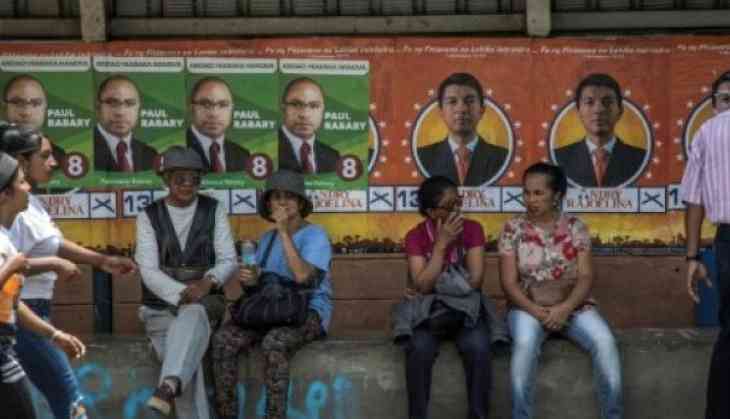Madagascar goes to the polls to pick next president

Madagascar was voting on Wednesday for a new president in unprecedented polls in which the three front-runners are former heads of state facing-off amid efforts to defuse a political crisis.
Attempts by the most recent president, Hery Rajaonarimampianina, to change the large Indian Ocean island's electoral laws backfired, sparking nearly three months of sometimes violent protests in the capital Antananarivo.
The demonstrators forced Rajaonarimampianina to accept a "consensus" government tasked with organising the election in the poor country with a history of coups and unrest.
Nearly 10 million voters are eligible to cast ballots for one of 36 candidates who, as well as the three front-runners, include two ex-prime ministers, pastors and a rock star.
Polling stations opened at 0300 GMT and are due to close by 1400 GMT.
At the vocational college in the capital where former president Andry Rajoelina is expected to cast his ballot, several dozen electors queued patiently, an AFP team saw.
"I've come here to do my duty by voting before going to get something to eat for me and my family. I want a president who gets me out of poverty," said Eline Faraniaina, an unemployed 60-year-old.
One presidential contender must win 50 per cent of votes cast or a second round will be held on December 19.
Rajaonarimampianina is competing against two of his predecessors.
Marc Ravalomanana, a milk mogul, ruled from 2002 to 2009 and Rajoelina, a former club night promoter nicknamed "the disc jockey", succeeded him and was in power until 2013.
The trio staged massive rallies over the weekend in the capital, each attracting tens of thousands of supporters.
The former French colony has struggled to overcome political divisions after a disputed 2001 election that sparked clashes and a 2009 military-backed coup that ousted Ravalomanana.
Apart from protests earlier this year, Rajaonarimampianina's term was mostly peaceful but anger over the past still simmers.
He has promised "a new phase" in Madagascar's development if elected.
"I'm poor. I live hand to mouth, day to day. I don't have anything to eat for tomorrow," said Coledette, a mother-of-four angered by recent increases in the price of rice ahead of the poll.
The key battle will be between Rajaonarimampianina and the former presidents Ravalomanana and Rajoelina, according to analysts and the findings of a banned pre-vote poll seen by AFP.
The survey, commissioned by the German Friedrich Ebert Foundation, gave Rajoelina support of 25 per cent, Ravalomanana 17 per cent and four per cent for Rajaonarimampianina.
"The big risk of this election is that it will return us to an era of crisis," said Sahondra Rabenarivo, an analyst at the Malagasy Observatory on Public Life.
"It's very important that the results are credible and that the third-placed candidate accepts them," added Rabenarivo referring to the leading hopeful who will not advance to any second round which could see the leading two hopefuls do battle.
Tensions are high between Ravalomanana and Rajoelina who succeeded him with the backing of the army in the 2009 uprising.
Madagascar is one of the world's poorest countries, according to World Bank data, with almost four in five people living in grinding poverty.
The trio of main contenders -- armed with significant campaign resources -- have criss-crossed the island of 25 million by helicopter promising voters a better future.
"They should revive the country. Madagascar suffers malnutrition and is ravaged by cyclones," said retiree Lili Rahaingo, 68, as she queued to vote in the capital.
Although there were bloody protests in April that left two people dead, campaigning passed off peacefully.
The candidates have however been accused of vote-buying.
The head of Transparency International in Madagascar, Ketakandriana Rafitoson, was "disgusted" by what she says was the use of T-shirts, sewing machines and even floor tiles to secure votes.
The election will be seen as an important opportunity for rivals Ravalomanana and Rajoelina to settle past scores at the ballot box, according to commentators. Both were banned from contesting the last elections in 2013.
Ravalomanana, who lived in exile in South Africa until 2014 after his removal from office, is still bitter after his removal by Rajoelina in the coup that left the island internationally isolated and bitterly divided.
Rajoelina is banking on his youth and communication skills to rally support.
Around 20 lower-profile candidates have alleged irregularities in the electoral roll and had unsuccessfully called for the poll to be delayed.

